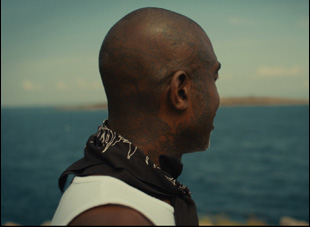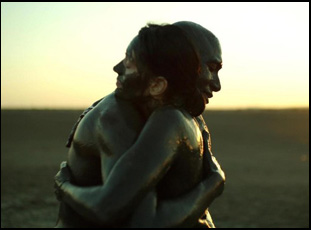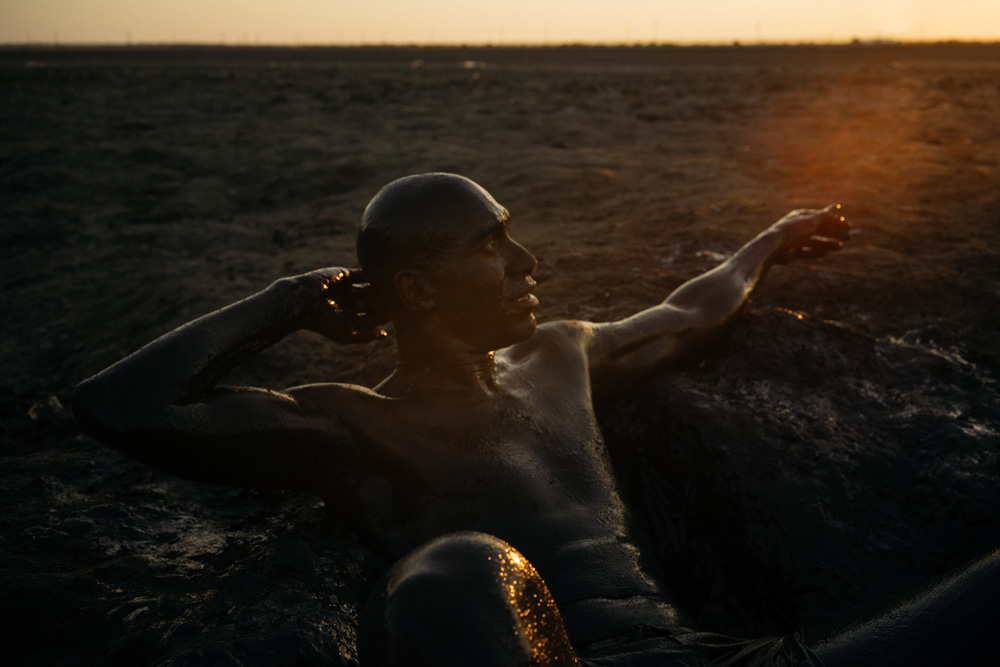Derrick B. Harden was obliged to start pulling from his notebook of rap songs to accompany the narrative of “The Black Sea,” a film for which nothing was ever actually written down per the ever-evolving creative process of its co-director Crystal Moselle, who has increasingly blurred the line between narrative and nonfiction since her doc debut “The Wolfpack” led to the street savvy dramas “Skate Kitchen” and the HBO series “Betty.” Playing a fish out of water in the comedy where he stands out as a Black American ex-pat in Bulgaria, Harden found himself right at home on the production when rather than memorize any lines, he would react spontaneously to the situation in front of him and bringing his own music into the fold, he realized that recording new songs inspired by the film would be unnecessary when the old ones had renewed meaning and seemed to fit the story like a glove.
“The lyrics are sometimes spooky because a lot of it’s coming beforehand and fitting into the scene,” said Harden, bemused that for a largely improvisatory film so much seemed predestined. “It was trippy.”
Partners in real life and behind the scenes for “The Black Sea,” Harden and Moselle’s shared appreciation for making the most of a given moment is on full display in their irreverent and ultimately irresistible collaboration in which Harden plays Khalid, who seems woefully out of place in New York where he grew up as he contends with limited job opportunities and far fewer that would actually suit him, making him a touch too excited to answer a Facebook post from a woman half a world away promising to be a bit of a sugar mama. Decked out in a Wu Tang jersey and towering above the locals upon arriving in the port city of Sofia, he may look even more adrift in Bulgaria, especially after learning that his expected benefactor passed away before he could meet her, yet it doesn’t take long for him to spot someone in a DMX T-shirt and instead of becoming an outsider, the qualities that make him stand out lead to his embrace – quite literally, with many coming up to hug him – as the tight-knit community is intrigued enough to make a little more room for him.
As Khalid looks less and less eager to get back to the States, particularly when he starts to bond with Ina (Irma Chichikova), the travel agent who could help facilitate his trip back to New York, “The Black Sea” becomes a getaway for moviegoers as well when Moselle and Harden summon the pleasures of letting go of the life one has to be able to see more clearly how it could change for the better upon entering an entirely different world. Surrendering to what may come was an organic part of the production, which came together like a whirlwind and somehow has retained that same propulsive energy in the final product when Moselle been perfecting an approach to capture real life and make it a bit more magical. Enlisting her father Charles for the film’s sitar-heavy soundtrack, the film has in its very fabric a notion that it ends up championing as past experience can inform how to look to the future anew and while there was never a script to reference, there was plenty to draw from to create such a rich tale of acceptance.
After its premiere earlier this year at SXSW, we were fortunate enough to have this conversation with Moselle, Harden and producer Izabella Tzenkova about how they put together such a singular picture and delighted to share it now as the film begins making its way into theaters across the country, first launching this week at Metrograph in New York where Harden and Moselle will be on hand for screenings of not only “The Black Sea” but additional screenings of “Sweet Sweetback’s Baadasssss Song” and “Skate Kitchen” that promise to be truly special events.

Izabella Tzenkova: Derrick came to visit me [in Bulgaria], the previous summer before last and Derrick just had too good of a time. He had some pretty interesting experiences, which he can speak to, but the following year in 2023, Crystal calls me and says, “How would you like to shoot a movie at the Black Sea this summer?” And I said, “What’s the idea?” And she said, “Let me think about it. I’ll call you next week. [laughs] And literally six months later, we’re at South by Southwest [with the finished film].
Crystal Moselle: Yeah, it was an experiment at first. We wanted to make something and Derrick and I were shopping around this pilot that was getting some traction before the strike happened. And this came out of the pure need to have self-expression, [which is] just at the core of what we’re about. Wherever we go, Derrick does what Khalid did in the film — he creates a community or he becomes friends with everybody — and he had a unique experience in Bulgaria…
Derrick B. Harden: And it’s beyond just a unique experience. A lot of people don’t know in my personal life, I used to read about the Balkans. I don’t know how I got there, but I used to read about it in school. And I’ve visited so many places in Eastern Europe [where] I’m very much aware I’m a Black man, but this was the first I visited [where] I felt being Black was curious. It interesting, [not like] this everlasting theme of racism. So I started to have fun in this arena with creativity because I’m a Black artist and I love stereotypes as long as they’re safe for me to have fun with, and do some type of exchange. When I felt those physical emotions where it didn’t feel like nobody was laughing at me on the side, I wanted to make something here.
Then hip hop culture is very prevalent there. It doesn’t mean they’re listening to hip hop, but you see it through the youth from the sneakers that they’re wearing and [in general] one of America’s finest exports is hip hop, so we just had a darling of a time, playing with the exchange of culture and finding a world where we can promote togetherness, which is our main mission.
Something that I was so moved by, and I was curious if you knew of these kind of parallels I advance, was for example in the scene where you’re talking about the princesa, the Bulgarian bread with the cheese on it, and Derrick comparing that to how your mother used to make out of your character’s mother used to make a similar dish. Did that emerge as you were making it?
Derrick B. Harden: It emerged, like when you think about America’s welfare system, and then you think about communism in Eastern Europe, it’s very parallel. When I first lived in Moscow, I said that 20 years ago, “Oh, wow, there’s a lot of lines here.” And then I realized that I grew up on a line [myself in America]. I grew on the powdered milk, the free cheese, the food stamps. You gotta wait, you gotta wait, you gotta wait. And I [thought], “Whoa, these lives are very similar.”
Crystal Moselle: And we were also not trying to beat it down, but we really wanted to explore the similarities and the cultural exchange with what we could find, but not make some really obvious connections.
Izabella, it looked like the entire community bought into this. What it was like creating the infrastructure for a shoot like this?
Izabella Tzenkova: Well, we created the infrastructure in about a week. [laughs] And I pulled the trigger a week before [Crystal] got to Bulgaria, and we put together a crew in a week. We were very lucky that it was a place I know really well, and everyone [was initially feeling], “What the hell is going on here?” But they really jumped in and were excited to be a part of it and ready to help. It’s a resort town, so a lot of people come there in the summer, and as someone that has been going there for the last 15 years, I’m pretty local [now] and people were really excited and curious to see what was going on and to take part in it.
Derrick B. Harden: Yeah, the coolest thing was when the older women of the resort town, the grandmothers, all spoke highly of us. That helped immensely.
Crystal Moselle: There’s this one [area] that we called Granny Row and all the grannies would just sit on the street. That’s where [in the film Derrick] went to ask them if they knew where anywhere to stay and they actually had no idea we were shooting at that moment. We told them afterwards, obviously, but they were walking around trying to find him a place to stay, holding his arm. There were so many moments that just happens beautifully and unexpectedly.
Derrick B. Harden: That’s probably one of my favorite scenes.
Crystal, as a longtime admirer, I’ve been curious about the fact that you’ll usually work with editors with a background in documentary for your narrative work and wondered whether knowing what the back end of something like this looks like helps you create the loose environment on set?
Crystal Moselle: This is the first time I’ve ever [shot something] with no script and it felt very comfortable and it felt like my language. Also, I recently had been teaching this acting class in lower Manhattan, just doing these improv moments and Derrick and I do little skits all the time, [which] is just the direction where I think we shine. The most beautiful moments come out of it, and it’s something that we’re perfecting really nicely. But as far as the editing, I don’t think there’s a documentary editor or a scripted editor. It’s all the same. You’re telling the story. You have to have a bit more patience as a documentary editor, but we had several people helping us with this.
Derrick B. Harden: One of the coolest things about making this is that, in essence, it is a documentary, like flat out. And outside of making movies, I’m an underground rapper and when I’m following the thread that Crystal’s laying as a documentary person, I’m able to improvise a little bit more than the average actor because with rap, it’s intense improvisation. Even when you’re hitting the notebook with lyrics, it’s on the spot. You have an hour to write that verse [which means] you only have 30 minutes. You have 30 minutes to write it and 30 minutes to spin it and it’s what we’re calling cinematic freestyle. And with Izabella’s guidance, she’s like Phil Jackson, Crystal’s like Michael Jordan, coming from the doc world, and then I’m like Dennis Rodman, adding to the Bulls of that year that they needed to win those three championships.
Crystal Moselle: It was my favorite time filming. It’s best I’ve ever had, truly.
Derrick B. Harden: And we’ve all heard freestyle and then we listened to it two months later, and we’re like, “This feels like a song. This is a song.” And that’s what happened.
In a literal sense, what was it like to work on the music? It looked like Crystal’s dad may have been involved?
Derrick B. Harden: Crystal and I worked with Charles Moselle and we sat in every session to help come up and [Charles] is amazing. He can play every instrument. He can do anything.
Crystal Moselle: Yeah, it was Derrick’s idea to have my dad come on board to do this with us. Another film that we’re doing is on my father when he was working in a psych ward in the ‘70s. And we fully just collaborated — my dad, who can play every instrument you can think of, also did some research on some like Bulgarian instruments…
Derrick B. Harden: He did his homework because we were mixing Bulgarian culture and African American hip hop culture and trying to make it make sense. And Charles is of the age where he was at the beginning of hip hop, but he was also already in music, and my hip hop has a particular in-the-beginning-of-hip-hop sound, so utilizing those things that Charles understoo, that most composers don’t, [in addition to] his own research and study with Bulgarian music, what he created was incredible.

Izabella Tzenkova: I definitely think I got a few gray hairs. It was total madness. We had a very small crew. And we were all wearing a lot of different hats. But that’s when I thrive. And it was insane.
Derrick B. Harden: Yeah, these ladies introduced me to a technique where we started editing when we shot the first day, so it was like making an album. It was like, I go to the studio today, I record two songs and before I leave, we’re going to mix these same two songs that I recorded, so when I come back tomorrow, I got two songs almost done, and I’m about to make another two. It was a very new process, but very familiar.
Izabella Tzenkova: We really did shoot it more like a documentary where we didn’t have six-day weeks, but we would shoot two or three days and then take a day down because we knew that something we wanted to capture something that was happening in the town like a day after or we knew someone was coming in town that like we wanted to feature, so it was very unconventional in that way.
Derrick B. Harden: And we just wanted to see what the story that we were working on was. What story do we have here?
Izabella Tzenkova: Literally, this story took shape as we were shooting.
Crystal Moselle: We would meet people and be like, “Oh shit, we need them back in the film,” and then they’d say, “Well, I’m working the next six days, but I can come for an hour on Tuesday.” And we’d shift the whole schedule around, so they could come and be with us for one hour because we love them so much.
Derrick B. Harden: And then our magical friend that lifts me up [near the end of the film]. That was when we first met him.
Crystal Moselle: That was really right when we met him.
Derrick B. Harden: And then we brought him back! [laughs] The man violated me. I went to give him a handshake and he lifted me up…
Crystal Moselle: He just came from wrestling. And we liked him so much, we just kept bringing him back. We brought him onto the marina and he brought his little captain hat.
Izabella Tzenkova: But then there was one day where we had a critical scene and he didn’t show up because he had a party to go to. There were situations like that where we had to suddenly come up with something else to shoot or change the scene we had in mind completely because someone didn’t show up. Working with real people was challenging from a production standpoint, but that’s what brought the authenticity to it.
Crystal Moselle: It brought the magic though because there’s certain people that you thought, “Oh, they’re going to be there,” and then they all flaked, but then the scene became something else and it worked way better for the movie.
Derrick B. Harden: This is what I wanted to say in the beginning. When we first took the trip, we were in Greece and we were going to go to Bulgaria and we waiting for the transfer plane to go to Sofia [the capital of Bulgaria]. And this Bulgarian woman is drinking a beer and looking at me and Crystal very oddly. She puts her beer down and comes up to us and [says], “Where are you going?” And we told her, “We’re going to Bulgaria.” And she looked very concerned.
Crystal Moselle: She goes, “Why?” “Why would you go there?” “Why?”
Derrick B. Harden: I started to get scared.
Crystal Moselle: We’re like, “Why? Are you from there?” And she goes, “Yes. And I have to go there, but why would you?” And then I [said], “Oh, we’re going to have the best trip because this lady said that.”
Derrick B. Harden: That’s true. Then we made a whole movie out of it.
Izabella Tzenkova: It’s an uncut gem.
Derrick B. Harden: It really is.
“The Black Sea” opens in New York on November 22nd at the Metrograph and Los Angeles on December 12th at the Laemmle Royal.




